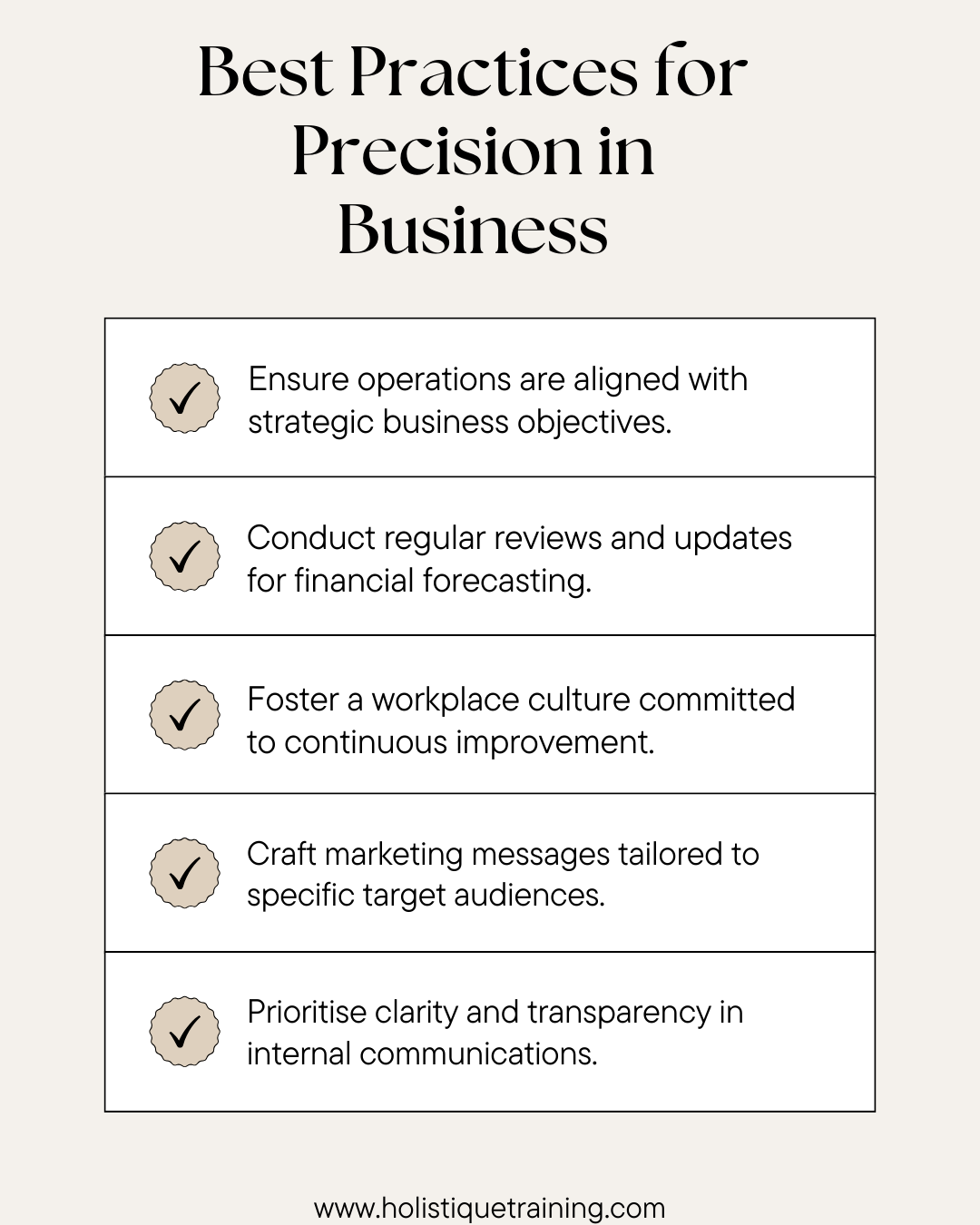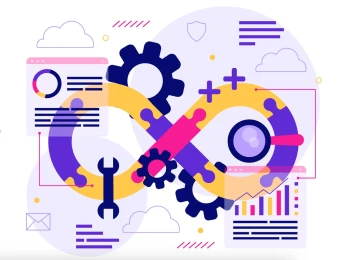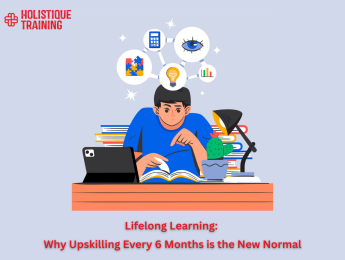- Table of Contents
- Introduction
- What Is Precision in Business?
- 1. Precision in Sales Scaling: Navigating Growth with Targeted Strategies
- 2. Precision Crafting: Shaping a Compelling and Unique Value Proposition
- 3. Precision Passion Alignment: Strategic Channelling of Entrepreneurial Zeal
- 4. Precision Pipeline Construction: Building Quality Opportunities
- 5. Precision Leadership: Fostering Excellence and Development
- Why Is Precision in Business Important for Entrepreneurs?
- Minimising Risks
- Resource Optimisation
- Enhancing Decision-Making
- Building Credibility
- Adaptability and Innovation
- Customer Satisfaction
- Cost Efficiency
- Strategic Planning
- Employee Productivity
- Competitive Edge
- 10 Ways to Use Precision to Scale Your Business
- 1- Define Clear Objectives
- 2- Thorough Market Research
- 3- Customer Segmentation
- 4- Data-Driven Decision-Making
- 5- Streamlined Operations
- 6- Strategic Partnerships
- 7- Innovative Product Development
- 8- Effective Marketing Strategies
- 9- Financial Forecasting
- 10- Continuous Improvement
- The Role of Precision in the Sustainability of Your Business
- Adaptability to Change
- Customer Retention
- Risk Management
- Strategic Planning for the Future
- Employee Engagement and Retention
- Environmental and Social Responsibility
- Investment in Technology
- Diversification of Revenue Streams
- Conclusion
Introduction
In the dynamic landscape of entrepreneurship, where every decision carries weight and every action has consequences, the value of precision cannot be overstated. Precision is more than just a buzzword; it's a strategic approach that can make or break a business. In this comprehensive exploration, we delve into the intricacies of precision in business, its profound importance for entrepreneurs, actionable ways to leverage it for business growth, and its pivotal role in sustaining long-term success.
What Is Precision in Business?
Precision in business goes beyond mere accuracy; it's a multifaceted concept that involves a meticulous and deliberate approach to every aspect of your enterprise. It encompasses a keen attention to detail, strategic decision-making, effective communication, and the ability to execute plans with exactitude. From product development to marketing strategies, financial management to customer relations, precision demands a comprehensive understanding and control over every facet of your business.
Precision is not about being overly cautious; instead, it's a calculated and well-informed methodology that minimises errors and maximises outcomes. It involves aligning your actions with your business objectives, avoiding unnecessary risks, and optimising resources to achieve the desired results.
1. Precision in Sales Scaling: Navigating Growth with Targeted Strategies
Scaling up sales demands a nuanced approach. Precision in this context entails identifying and engaging specific customer segments through tailored strategies. It requires a deep understanding of market intricacies, analysis of customer behaviour, and adaptability in sales tactics. This precision ensures that resources are strategically allocated, maximising the effectiveness of sales initiatives.
2. Precision Crafting: Shaping a Compelling and Unique Value Proposition
Your business proposition is the essence of your enterprise. Precision here involves crafting a distinct, clear, and compelling value proposition. It's about articulating not only what you do but why it matters. Precision in your proposition guarantees that your messaging resonates with your target audience, establishing a foundation for customer engagement and loyalty.
3. Precision Passion Alignment: Strategic Channelling of Entrepreneurial Zeal
Passion propels entrepreneurial endeavours, and precision amplifies its impact. It requires aligning your passion with a clear vision and purpose for your business. Precision in passion means strategically channelling your enthusiasm, focusing on aspects that leverage your strengths and align with your values. This precision ensures that your passion becomes a driving force for sustained success.
4. Precision Pipeline Construction: Building Quality Opportunities
Constructing a robust sales pipeline is pivotal for business growth. Precision in this context involves strategic lead generation, meticulous qualification processes, and a thorough understanding of the customer journey. It means investing time and resources in prospects aligned with your ideal customer profile, ensuring that your pipeline is not just filled but filled with high-quality opportunities.
5. Precision Leadership: Fostering Excellence and Development
The success of any business hinges on its people. Precision in leadership transcends hiring and firing—it involves cultivating a culture of excellence, clear communication, and continuous development. It means comprehending the strengths and aspirations of your team members, aligning them with the business goals. Precision in leadership ensures that your workforce is not just skilled but motivated and dedicated to the collective success of the organisation.
In essence, precision in business is a comprehensive approach that permeates every facet of entrepreneurial endeavours. From the way you sell and communicate your value to the passion that fuels your efforts, precision is the thread that weaves together a coherent and effective business strategy. It's about being intentional, strategic, and meticulous in every aspect, creating a foundation for sustainable success.
Why Is Precision in Business Important for Entrepreneurs?
For entrepreneurs navigating the competitive business landscape, precision is a game-changer. Here's why it holds such paramount importance:
Minimising Risks
Imagine entrepreneurship as a high-stakes chess game. Every move counts, and one wrong decision can have cascading consequences. Precision allows entrepreneurs to anticipate and mitigate risks effectively. By thoroughly analysing potential pitfalls, entrepreneurs can take calculated risks and navigate challenges with confidence. It's not about avoiding risks altogether; it's about understanding them with precision and devising strategies to mitigate their impact.
Resource Optimisation
In the entrepreneurial world, resources are akin to gold. Every dollar, every hour, every skill set must be utilised with maximum efficiency. Precision ensures that resources are allocated judiciously, preventing waste and inefficiency. Whether it's budget allocation, time management, or manpower deployment, a precise approach optimises resources, allowing entrepreneurs to do more with less.
Enhancing Decision-Making
The lifeblood of entrepreneurship is decision-making. Every decision, big or small, shapes the trajectory of the business. Precision in decision-making involves a thorough analysis of data, market trends, and potential outcomes. It's about making informed choices rather than relying on gut feelings. Entrepreneurs who embrace precision in decision-making are better equipped to navigate the complexities of the market and seize opportunities with a calculated approach.
Building Credibility
Credibility is the currency of trust in the business world. Precision in delivering products or services builds a reputation for reliability and excellence. Consistency in meeting deadlines, exceeding customer expectations, and delivering on promises establishes credibility. This, in turn, fosters customer loyalty and positive word-of-mouth, creating a virtuous cycle that contributes to the long-term success of the business. Also, according to Safe Graph, precision in data cultivates trust within and beyond your business.
Adaptability and Innovation
The business landscape is in a constant state of flux. Market trends evolve, consumer behaviours change, and technological advancements disrupt industries. Precision allows entrepreneurs to adapt to these changes with agility. By staying attuned to market dynamics and embracing innovative solutions, entrepreneurs can position their businesses not just to survive but to thrive in dynamic environments.
Customer Satisfaction
Satisfied customers are the backbone of any successful business. Precision in understanding customer needs and delivering solutions that precisely meet those needs is the key to customer satisfaction. It involves active listening, continuous feedback loops, and a commitment to consistently improving products or services based on customer preferences.
Cost Efficiency
Financial prudence is a cornerstone of successful entrepreneurship. Precision in financial management ensures that every penny is accounted for. Entrepreneurs who meticulously budget, analyse costs, and price products or services with precision maintain healthy profit margins. This financial resilience is crucial for weathering economic uncertainties and sustaining the business over the long term.
Strategic Planning
The path to success is rarely a straight line; it's more like a carefully plotted journey on a map. Precision in strategic planning involves setting clear, achievable objectives, identifying key performance indicators, and creating detailed road maps. Entrepreneurs who approach strategic planning with precision have a well-defined direction, making it easier to navigate the complexities of the market and achieve long-term goals.
Employee Productivity
The success of a business is intricately tied to the productivity and satisfaction of its employees. Precision in internal operations involves clear communication, well-defined roles, and efficient processes. When employees understand their responsibilities with clarity, and workflows are optimised for efficiency, productivity soars. In fact,statistics show that employees with clear roles are 53% more efficient and 27% more effective than those facing role ambiguity. This, in turn, contributes to a positive work culture and employee satisfaction.
Competitive Edge
In a crowded marketplace, standing out is a challenge. Precision provides entrepreneurs with a competitive edge. Businesses that consistently deliver precise, high-quality products or services create a distinct identity in the minds of consumers. This differentiation is invaluable, attracting and retaining customers in a competitive landscape.
In essence, precision in business is not a luxury or an optional extra; it is the very fabric that holds together the tapestry of entrepreneurial success. It's the thread that weaves through every decision, every action, and every interaction, creating a cohesive and resilient business model. For entrepreneurs, precision is not a one-time effort but a continuous commitment to excellence and a relentless pursuit of strategic clarity. In a world where the margin for error is slim, precision is not just important—it's indispensable.
Table 1: Key Performance Indicators (KPIs) for Entrepreneurs Who Prioritise Precision
Key Performance Indicator | Description | Importance for Precision |
Decision-making accuracy | Informed choices based on data and analysis. | Fundamental for strategy |
Resource utilisation efficiency | Optimal use of resources, minimising waste. | Essential for cost control |
Customer satisfaction levels | Consistently meeting or exceeding customer expectations. | Core to building credibility |
Employee productivity rates | Efficient workflow, high output, and job satisfaction. | Drives operational precision |
Timeliness in project delivery | Meeting deadlines with precision for client satisfaction. | Critical for reputation |
10 Ways to Use Precision to Scale Your Business
Scaling a business is a complex endeavour that requires strategic vision, meticulous planning, and, above all, precision. Entrepreneurs seeking to expand their enterprises must navigate the challenges with finesse and attention to detail. Here are ten actionable ways to leverage precision in scaling your business:
1- Define Clear Objectives
Before embarking on the journey of scaling, it's crucial to define clear and achievable objectives. Precision in goal-setting ensures that every effort is directed toward a specific outcome. Whether it's increasing market share, expanding product lines, or entering new markets, having well-defined objectives provides a roadmap for scaling success.
2- Thorough Market Research
Precision in scaling begins with a deep understanding of the market. Conduct thorough market research to identify opportunities, assess demand, and understand the competitive landscape. Precision in market research allows entrepreneurs to make informed decisions, tailor products or services to market needs, and identify strategic entry points for expansion.
3- Customer Segmentation
Not all customers are the same, and precision in customer segmentation is key to scaling effectively. Identify and target specific customer segments with tailored marketing strategies and product offerings. Precision in customer segmentation allows for a more personalised approach, increasing the likelihood of success in new markets or with new products.
4- Data-Driven Decision-Making
Scaling without data is like sailing without a compass. Embrace data-driven decision-making to guide your scaling efforts. Analyse key performance indicators, customer feedback, and market trends with precision. Data-driven insights provide a solid foundation for strategic decisions, minimising risks and maximising the effectiveness of your scaling initiatives.
5- Streamlined Operations
Efficiency is the backbone of successful scaling. Streamline internal operations with precision, identifying and eliminating bottlenecks, redundancies, and inefficiencies. A well-optimised operation ensures that the business can handle increased demand without compromising quality or incurring unnecessary costs.
6- Strategic Partnerships
Scaling is not a solo journey; strategic partnerships can amplify your efforts. Choose partners with precision, aligning with organisations that complement your goals and bring added value. A precise approach to partnerships involves clear communication, mutually beneficial terms, and a shared vision for growth.
7- Innovative Product Development
Scaling often involves expanding your product or service offerings. Precision in product development is essential to meet the evolving needs of your target audience. Regularly gather customer feedback, stay abreast of industry trends, and innovate with purpose. This precision in product development ensures that your offerings remain relevant and appealing as you scale.

8- Effective Marketing Strategies
Marketing is the engine that propels scaling efforts. Develop and execute marketing strategies with precision. Identify the most effective channels to reach your target audience, craft compelling messages, and monitor the performance of your campaigns with meticulous detail. Precision in marketing ensures that your message resonates and drives customer acquisition.
9- Financial Forecasting
Scaling without a clear understanding of your financial landscape is a recipe for disaster. Implement precise financial forecasting to anticipate the costs, investments, and returns associated with scaling. A detailed financial plan provides clarity on budget allocation, resource requirements, and the financial viability of your scaling initiatives.
10- Continuous Improvement
Scaling is not a one-time event; it's an ongoing process. Foster a culture of continuous improvement within your organisation. Regularly evaluate your processes, seek feedback from customers and employees, and adapt your strategies based on lessons learned. Precision in continuous improvement ensures that your business remains agile and responsive to changing market conditions.
Scaling a business is a dynamic and multifaceted challenge that demands precision at every turn. It's not just about expanding for the sake of growth; it's about doing so with purpose, strategy, and a commitment to maintaining the quality and values that define your brand. By incorporating precision into these ten key areas, entrepreneurs can navigate the complexities of scaling with confidence and set the stage for sustainable long-term success.
The Role of Precision in the Sustainability of Your Business
Beyond scaling, precision plays a pivotal role in ensuring the long-term sustainability of your business. Consider these key aspects:
Adaptability to Change
Sustainability is synonymous with adaptability. Markets evolve, consumer preferences shift, and unforeseen challenges emerge. Precision allows entrepreneurs to anticipate changes with clarity. By staying attuned to industry trends and customer behaviours, businesses can adapt their strategies with agility. Precision in understanding the dynamics of change positions the business not just to weather storms but to seize opportunities that arise from a dynamic environment.
Customer Retention
Acquiring new customers is undoubtedly vital, but sustaining a business relies heavily on retaining existing ones. Precision in customer relationship management involves understanding customer needs with depth. By delivering consistent quality and personalised experiences, businesses can build long-term relationships. Precision in maintaining customer satisfaction fosters loyalty, reducing churn and contributing significantly to the sustainability of the business.
Risk Management
The business landscape is rife with uncertainties, but precision in risk management acts as a shield. Entrepreneurs who meticulously identify, assess, and mitigate risks are better equipped to navigate challenges. Precision in risk management involves foreseeing potential threats and having contingency plans in place. This proactive approach not only safeguards the business but also enhances its resilience in the face of unforeseen circumstances.
Strategic Planning for the Future
Sustainable businesses are not just concerned with the present; they have one eye fixed firmly on the future. Precision in strategic planning involves forecasting industry trends, technological advancements, and shifts in consumer behaviour. Entrepreneurs who meticulously plan for the future can position their businesses to capitalise on emerging opportunities and navigate potential disruptions with finesse.
Employee Engagement and Retention
The sustainability of a business is intrinsically tied to theengagement and retention of its workforce. Precision in human resource management includes providing clear career paths, fostering a positive work environment, and recognising individual contributions. Employee satisfaction is not a peripheral concern but a core element of sustainability. Businesses that prioritise their employees with precision tend to have lower turnover rates and a more stable and productive workforce.
Environmental and Social Responsibility
In an era where consumers increasingly value ethical practices, precision in environmental and social responsibility is paramount. Sustainable businesses operate with a conscientious approach, minimising their environmental footprint and contributing positively to society. Precision in these initiatives involves setting measurable goals, transparent communication, and a genuine commitment to making a positive impact beyond profit margins.
Investment in Technology
Technology is the backbone of modern businesses, and precision in adopting and leveraging technology is pivotal for sustainability. For example, a prominent European minerals company, according toBCG, implemented a digitally enabled energy control tower, coupled with a cloud-enabled data platform, AI, and advanced analytics. This comprehensive approach resulted in a remarkable 5% to 10% reduction in energy consumption. Consequently, the company is poised to achieve substantial cost savings, ranging from €8 million to €9 million annually. So, entrepreneurs must make strategic technology investments that align with their business goals. Precision in technology adoption ensures that businesses remain competitive, enhance operational efficiency, and meet the evolving expectations of their customers.
Diversification of Revenue Streams
Relying solely on one revenue stream is a risky proposition. Precision in diversifying revenue streams involves identifying complementary products or services, entering new markets, or exploring strategic partnerships. Diversification hedges against market fluctuations, reducing the business's vulnerability to economic downturns and contributing to its overall sustainability.
In summary, precision is not just a desirable trait for the sustainability of your business; it is the cornerstone upon which a resilient and enduring enterprise is constructed. Sustainability is not a passive state but an active, intentional pursuit. Entrepreneurs who infuse precision into their operations, strategies, and values are better positioned to weather storms, seize opportunities, and build businesses that stand the test of time. In the tapestry of sustainability, precision is the thread that weaves together foresight, adaptability, and a commitment to creating lasting value for customers, employees, and the broader community.
Conclusion
In conclusion, precision is not just a desirable trait; it's a fundamental component of entrepreneurial success. By embracing precision in every aspect of their operations, from decision-making to execution, entrepreneurs can navigate the complexities of the business landscape, scale their enterprises, and ensure long-term sustainability. It's not about being perfect; it's about being intentional, strategic, and unwaveringly committed to excellence. In the world of entrepreneurship, precision isn't a luxury; it's a necessity.
In your entrepreneurial journey, honing precision is a transformative step towards success, and our course, ‘Business Analysis Skills and Techniques,’ is designed to be your guide. Dive deep into the intricacies of strategic decision-making, effective resource optimisation, and meticulous execution—all essential elements of precision in business. Unlock the skills to analyse market trends, streamline operations, and foster a culture of continuous improvement. Elevate your business acumen and gain a competitive edge with our course, where precision becomes more than a necessity; it becomes your strategic advantage. Join us on this journey to not only embrace but master the art of precision in entrepreneurship. Your success story begins with precision—enrol today!
























